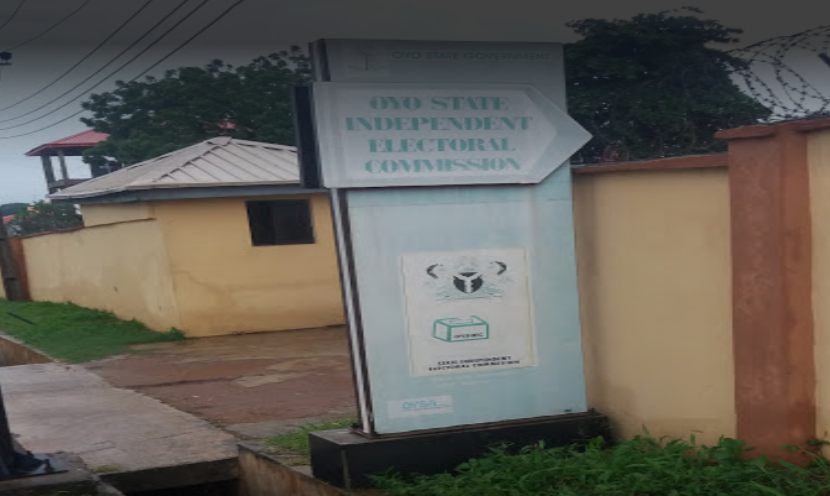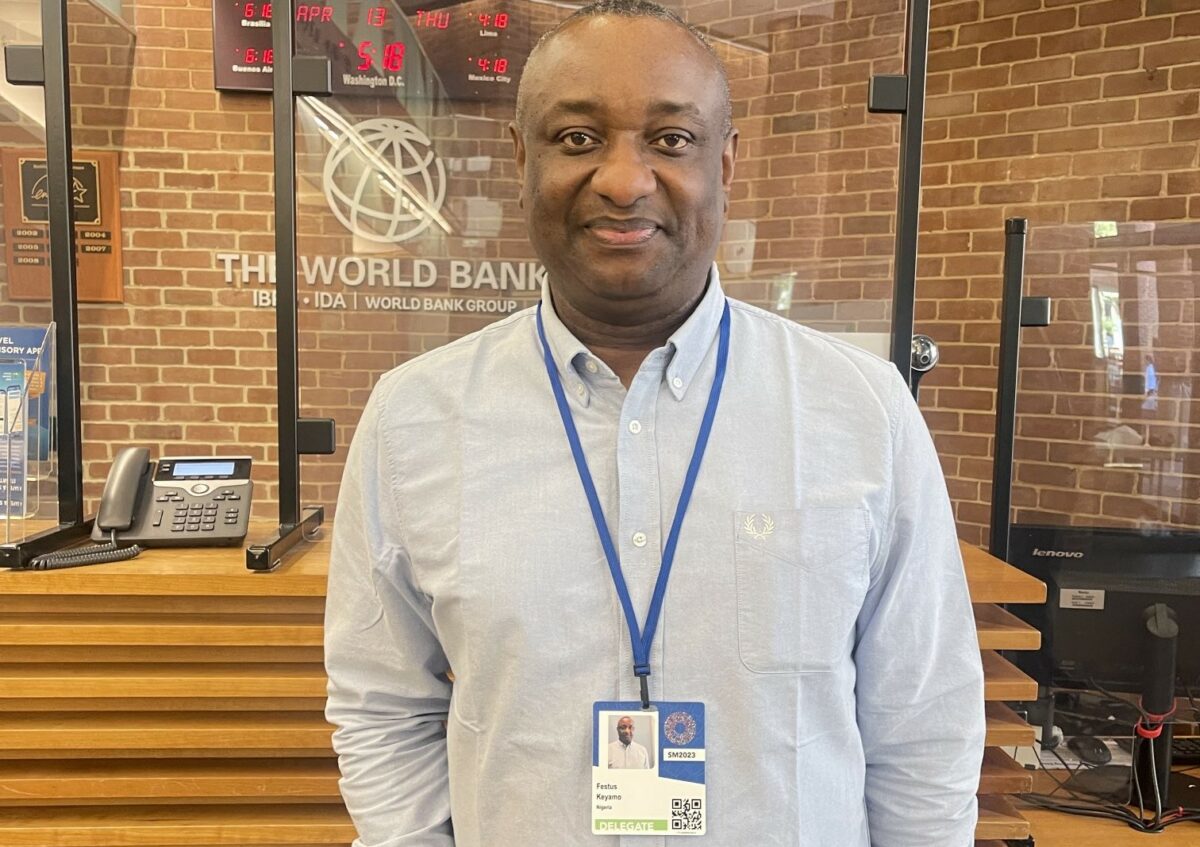Inside the multibillion-dollar petrochemical investment owned by Aliko Dangote, Africa’s richest man, is a never-ending event of construction activities.
On May 22, Former President Muhammadu Buhari alongside a few African heads of state and a horde of the crème de la crème of Nigerian society jetted at full throttle to officially commission the project.
It has been reported that over 30,000 Nigerians joined the skilled labour force recruited by contractors and subcontractors to work at the world’s largest single-train refinery. But it has not been said that scores of this number have died of negligence or safety defects.
Recently, three technical workers cheated death after a fall from a high-rise platform. The fourth person among them was not lucky. He bled to death in a hospital about one hour after the incident.
THE DREAM FOR JOB
Musa Sodiq, from a family of five, had apprenticed for vehicle repair engineering in Kebbi in the northwestern part of Nigeria. After completing his learning duration, there wasn’t enough money to acquire the necessary tools to stand on his own. So, he was on the lookout for a job that could fetch him the needed money.

Luck smiled on him one day when his Lagos-based friend told him there were construction jobs at the Dangote Refinery. More conversations about job opportunities propelled him to journey down to the country’s commercial hub sometime in July 2022.
In the same month, the job-seeker landed a ‘Construction Helper’ job at the construction site, earning a stipend each month. His job description entailed coupling or decoupling bracing, scaffolding, temporary structures and other assigned jobs.
Sodiq learned on the job as a scaffolder. He was recruited into Chemie-Tech, a procurement and construction management services firm, where he started putting his newly-acquired skill into practice.

The journey of Sodiq was not significantly dissimilar to that of Ujum Okechukwu, Udoyen Samuel and Charles. All of them moved from their previous jobs paying between N45,000 to N60,000 a month to Chemie-Tech where their monthly pay was pegged at N80,000.
BEFORE THE DISASTER
The four of them were at their different homes on Sunday, July 16, when their supervisor called them on phone to show up at the site for an emergency work.
According to their supervisor, the scaffold they had erected some days earlier had to be dismantled because it had been damaged by another contractor. The scaffold was inside an ill-lighted tank number 721-TT-1001A.
“My supervisor called me on that day (July 16) and he said I should come to the site. It was supposed to by my off-work day, but I still went because he was my supervisor,” Sodiq said.

Three supervisors were on ground to oversee the fixing.
“All our supervisors instructed us to climb the scaffold inside a completely dark tank without having a proper understanding of the problem. The place was supposed to be lit, but it was not,” Sodiq told FIJ.
“The supervisor decided to tap electricity from another site nearby. That only produced a dim light which could not light up the area. We told Phillips, Daniel and Lastman, who were our supervisors, to let us attach the damaged scaffold to another strong one owned by another contractor for us to climb safely.
“But they said we should drop the idea and climb. They practically threatened us to climb it. They said if we were not ready to work, we should go home and forget having any job at the company. They said it was not as bad as we were making it to be. Based on that, we ended up going up. The scaffold was 18 metres high.”
READ ALSO: How Dangote Refinery Ruined the Economy of the Ancient Town of Lekki
The structural integrity of the metal scaffold and its components had been severely compromised by an overload put on it be a different contractor. At the risk of a disaster, the supervisors overlooked the fault and instructed the hesitant workmen to go up.
DISASTER HAPPENS
No sooner had they gone up than the problem happened. They were about to start applying their tools atop the scaffolding when it collapsed under the pressure of their weight.
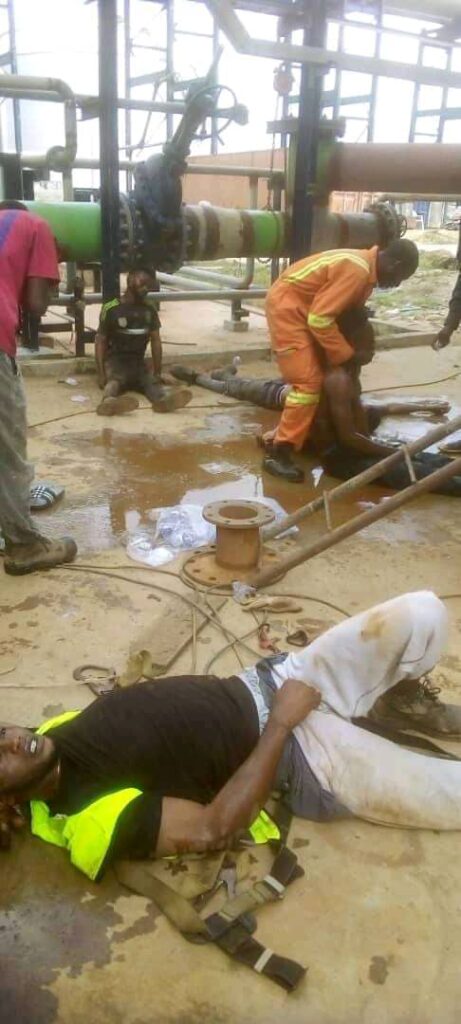
First off, Charles hit his head on the concrete floor and blood started gushing out of his mouth and nostrils. Having lost so much blood, he died afterwards.
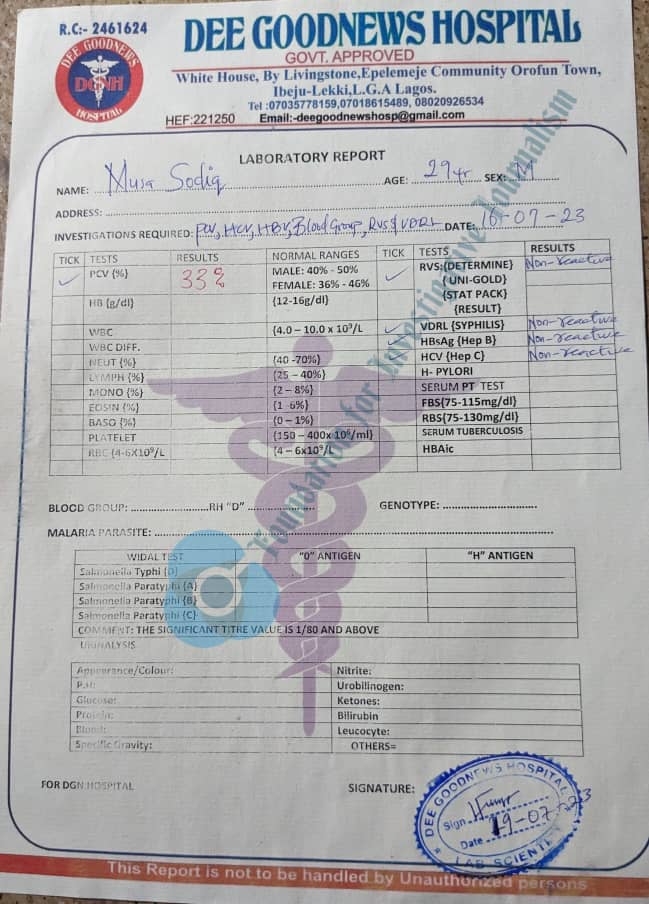
Lastman, an Indian supervisor, vanished into thin air immediately he realised the extent of what had happened. Everyone was in a confused state.
READ ALSO: Can Dangote Refinery Handle All of Nigeria’s Crude?
“Immediately we went down, Lastman ran away. Note that he is an Indian. Daniel and Phillips were there, but help did not come our away for about 30 minutes. It was Dangote security guards that later rushed us to Dee Goodnews Hospital which was not far from the refinery. Charles was not lucky, however. He died,” said Samuel.
AGONY BEFORE SURGERY
Charles, whose wife recently gave birth to a baby, was moved to a morgue. His surviving colleagues suffered disproportionate levels of injuries and spent weeks in the hospital undergoing surgeries and treatment.
Sodiq broke the upper segment of the femur of his right leg. Not only that, he had a displacement of the fractured segment, according to report by Pregcare Imaging situated in Ibeju-Lekki. Samuel also suffered the same fate.
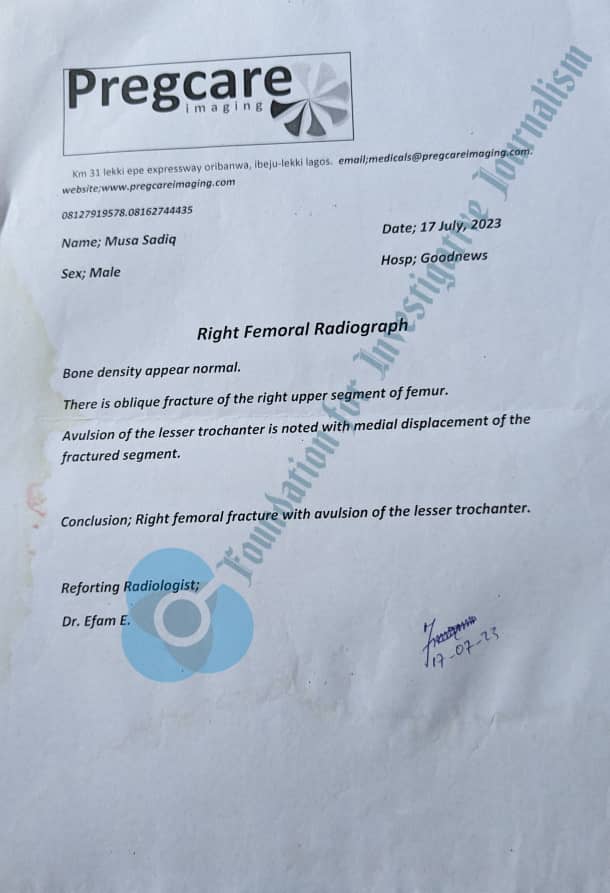
“After spending three days of agony at Dee Goodnews Hospital, we were transported to another hospital for surgery in the midnight and they returned us to Goodnews before dawn,” Samuel said.
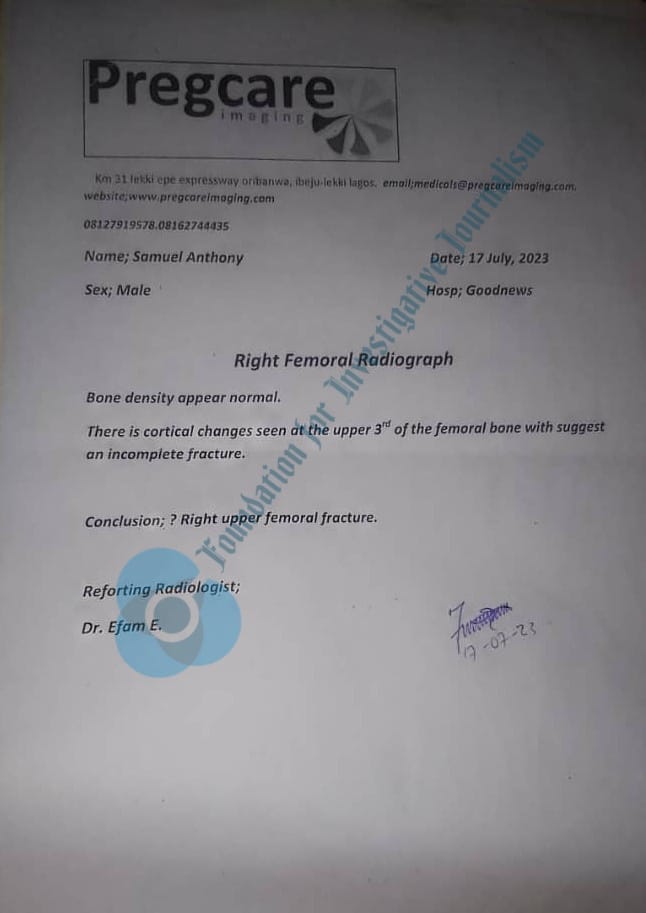
On August 12, when the surviving workers were discharged, the subcontractors for Samuel and Sodiq gave them N6,000 and N3,000 respectively as transport fare. They now walk with walking sticks. Chemie-Tech was responsible for their medical bills.
“MY SUBCONTRACTOR SAID SHE HAD PROFITTED FROM ME”
What happened to Okechukwu was a bit different. The injury he sustained wasn’t visible but he said that he experienced pain on his hips to date.
His walking process has become a painful one.

Okechukwu told FIJ that it came to his awareness that the company was not ready to treat him because his injury was not as severe as others. He demanded a proper treatment, but the company refused him.
Instead, the construction company paid him his salary purposely to enable him treat himself. He left the hospital on the fourth day. This, the workman said, revealed the value the firm placed on the lives of its workers.
“Just imagine what they did to me. They said I should go and treat myself from my pocket and I said I did not have any money to do that. It was then they paid me my salary and asked me to sort my issues out from it. I had to return to my state to explore local medicine options,” Okechukwu told FIJ.
READ ALSO: To Lekki Free Zone Residents, Dangote Refinery Has Brought ‘More Pain Than Joy’
“One thing my subcontractor told me that threw me off my feet was when she said she had not made enough gains from my recruitment and that she cannot expend any money on medical treatment. I am still unable to walk well. My ribs are paining me.”
Since discharge from the hospital, the duo of Sodiq and Samuel faced the challenge of proper care because they were far away from their families and they wanted to return home.
Musa Waliu, Sodiq’s elder brother, had been with his younger brother to provide some care but he said the best care for Sodiq was at home. For this reason, he wanted to take his brother home.
ISSUES AROUND COMPENSATION AS PRESCRIBED BY APPLICABLE LAWS
With the accident, both Samuel and Sodiq have been incapacitated and unable to make use of their hands to work. Their families approached the company to demand a compensation.
The company promised to pay them an equivalent of their monthly wages for six months consistently. This promise only applied to Samuel and Sodiq, however. Okechukwu was going through a healing process at his own cost.
After leaving the hospital, the company made an unwritten promise to pay only Sodiq and Samuel N80,000 monthly, the same amount they were earning before the incident, for the next six months (as prescribed by the Workmen’s Compensation Act). But this did not appear promising to the victims. For instance, Sodiq was paid on Monday while Samuel was only paid on Thursday after FIJ emailed their employers. Both former workmen had also called and visited the company’s office to demand for their pay.
Section 9 of the said law further allows a worker who intends to leave his neighbourhood in which he is employed to get a lump sum compensation from his employer.
“With my experience so far with Chemie-Tech since this avoidable accident happened, I do not think they would fulfill this obligation. My brother was not paid his first month wage until they went to their office about three times,” Waliu told FIJ.
“The other worker has not been paid at all. I want to take my brother home for adequate attention, but there are signs that the company would not pay anything once we are away.
“It’s been a miserable period for us. I have made several requests for the company to pay my brother a lump sum compensation so that we can leave this environment. They have ignored my emails, text messages and even phone calls. It appears the company has a different motive.”
READ ALSO: Shilla Boys Unmasked: Inside Adamawa’s Den of Young Terrorists Snatching Phones and Lives

The Dangote Refinery contractors did not respond to an email sent to two of its top officers and the direct email address listed on its website on Wednesday. On the same day, FIJ called Nagendra Singh Rana, who’s in charge of plant and machinery, and he promised to return the call on Thursday. On a follow-up call, he said that he was at a meeting and would call back within an hour but he had not done so at press time.
Subscribe
Be the first to receive special investigative reports and features in your inbox.






